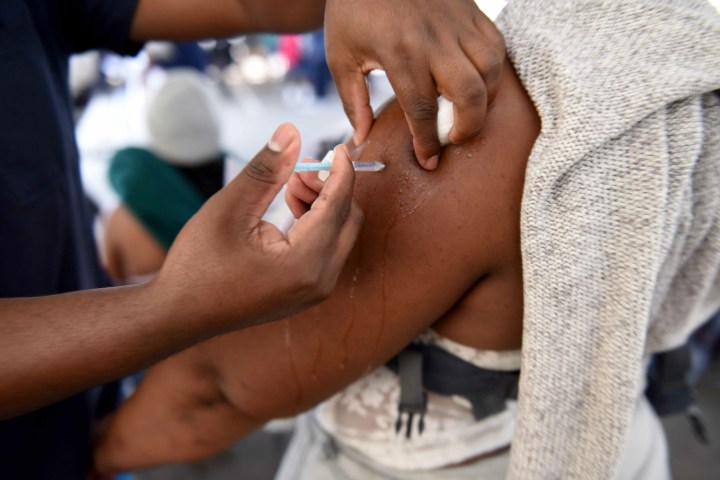SPOTLIGHT
Covid-19 – what happens now as vaccines expire and become harder to get?

Millions of doses of the Pfizer-BioNtech Covid-19 vaccine procured by the South African government have expired and the shot is largely unavailable to people in the country. Meanwhile, this month the World Health Organization declared an end to the Covid-19 ‘Public Health Emergency of International Concern’. Adele Baleta asks what all this means for Covid-19 in South Africa.
Several people who have contacted Spotlight have expressed “frustration” and “dismay” that despite the government having announced in February that it was sitting on a massive stockpile of almost 30 million vaccines, they are struggling to access the Pfizer shot.
Explaining the vast quantity of unused vaccines, the Health Department at the time said vaccine uptake has been low due to decreasing cases, people’s erroneous perception that the pandemic is over, and hesitancy affected by vaccine disinformation.
Expired but not expired?
Department spokesperson Foster Mohale confirmed that seven million Pfizer doses had expired but they would not be disposed of. Instead, the vaccine manufacturers would test the vaccines to ensure continued safety and efficacy. The South African Health Products Regulatory Authority (Sahpra) will review the test results and, if satisfied that the vaccine will still work as well as data showed before, they will approve an extended shelf life.

Several people who contacted Spotlight expressed ‘frustration’ and ‘dismay’ that they are struggling to access the Pfizer shot. (Photo: Marco Verch / Flickr)
The remaining estimated 23 million Johnson and Johnson (J&J) vaccine doses in South Africa are due to expire in 2024 and 2025.
“The expiry of a vaccine is not the same as the expiry date of food which cannot be extended,” Mohale says, adding that the Pfizer vaccine has a short shelf life and that its expiry date has been extended twice in the past. He says the testing should be done by June and the Pfizer shots would become available in July.
A mother from East London, who is hoping to emigrate to the US, told Spotlight she was “frantically” trying to get shots for her 12-year-old son in time to leave. In South Africa, none of the currently available Covid-19 vaccines have been authorised for use in children under the age of 16. Elsewhere in the world, for example in the US, the Pfizer vaccine has been tested and authorised for use for children from the age of 12. “It is mandatory that he get the vaccine before entering the United States,” she says.
An intern responding to people’s questions on the Department of Health’s hotline says: “Many callers have phoned in stressing about travelling, emigrating or getting vaccinated for the first time. We have been told that there are very few sites that still have some stock. If people have had two Pfizer doses, they can boost with a J&J dose. However, if they have only had one Pfizer, they will have to wait.”

The government announced in February that it was sitting on a massive stockpile of almost 30 million vaccines. (Photo: Nasief Manie / Spotlight)
The public exasperation expressed directly to Spotlight and on social media also relates to the department’s vaccination website being outdated and it being hard to find places to get vaccinated. As GroundUp reported in January, getting a Covid-19 booster jab is not as easy as it should be.
‘The pandemic is not over’
Referring to the WHO lifting the Covid-19 Public Health Emergency of International Concern (PHEIC) on 5 May, Mohale says: “The pandemic is not over and people, especially those who are at highest risk of severe disease and death, should get vaccinated.” These included people with comorbidities and the elderly. Vaccination for Covid-19 had been integrated into routine primary healthcare facilities, which is where people should go for their jabs.
WHO director-general Tedros Ghebreyesus said it was the end of the emergency phase but not the end of the threat of Covid-19. In the week before the announcement, he said the disease claimed a life (globally) every three minutes, “and that’s just the deaths we know about”.
The decision to lift the emergency was based on the decreasing number of deaths and hospital admissions from Covid-19, the high levels of population immunity against SARS-CoV-2, and the widespread availability of Covid-19 vaccines and treatments.
Read more in Daily Maverick: Fifteen more cases of Covid-19 ‘Kraken’ subvariant detected in South Africa
Ghebreyesus warned that the Covid-19 pandemic is not over and that the virus could still pose a serious threat to public health. The WHO has urged countries to continue to monitor the situation closely and to maintain preparedness measures, such as surveillance, testing and contact tracing.
Some experts have criticised the WHO’s decision to end the emergency phase, arguing that it is premature and could lead to a resurgence of the pandemic. Others have defended the decision, arguing that it is based on the best available evidence and that it is important to give countries the flexibility to manage the pandemic in a way that best suits their own circumstances.

The World Health Organization has declared an end to the Covid-19 ‘Public Health Emergency of International Concern’. (Photo: Nasief Manie / Spotlight)
‘Momentous’ announcement
Professor Salim Abdool Karim, director of the Centre for the Aids Programme of Research in South Africa, described the announcement as “momentous”. Writing in his regular Covid-19 updates blog, he says that “we are still living in the midst of a pandemic with thousands of cases each day. Since SARS-CoV-2 is going to be with us for a long time, a pragmatic decision was needed as the Covid-19 pandemic emergency has been steadily receding and a new variant of concern has not emerged in the last 17 months. But the risk of a new variant of concern is ever-present, even if it is getting progressively smaller with time. The public is also tired of the pandemic and many have simply put it out of sight and out of mind.”
Karim writes that globally there are currently far more Covid-19 cases, hospital admissions and deaths each day than we had on the day (30 January 2020) that Covid-19 was initially declared a PHEIC. “So, it (the WHO decision) was not based on the situation getting to a point pre-PHEIC. Waiting to reach that point may take many years or may never happen and so ending the PHEIC is a judgement call, taking many factors into consideration.”
‘Still with us’
Speaking at a recent webinar, hosted by Internews, science writer David Quammen, who wrote a book on Covid-19 called Breathless: The Scientific Race to Defeat a Deadly Virus and before that, Spillover, says: “The coronavirus is still with us, it’s circulating worldwide among humans, and circulating also among whitetail deer, feral mink and probably other wild mammals.”

According to the Health Department, Covid-19 has been integrated into routine primary healthcare facilities, which is where people should go for their jabs. (Photo: Denvor de Wee / Spotlight)
He says efforts need to be directed towards approaching Covid-19 as a long-term cause of human illness, suffering and death, not “a short-term catastrophe”.
Read more in Daily Maverick: Fringe anti-vax group targets SA’s authorisation of Pfizer’s Covid vaccine
He says laboratory techniques need to be improved as well as manufacturing capacity for updated Covid-19 vaccines. Inequitable access to vaccines will need to be solved. “We will need to dissolve vaccine reluctance and refusal – among the privileged but obdurate, and also among those historically ill-served by Western medicine – with better communication and education.” Diagnostic testing needs to be maintained and not reduced, as well as the sequencing of genomes from patient samples to detect and trace new and immune-evasive variants, he says.
“We will need to prepare, not just for the next coming of SARS-CoV-2 (when it emerges from some infected human, or some deer or mink) but also for the next coronavirus or influenza virus (more than likely H1N1) or other highly adaptive animal-borne virus (there’s a whole rogue’s list of possibilities) that appears in humans, seemingly out of nowhere,” he says. “But they don’t come out of nowhere. They come from nature.” DM
This article was published by Spotlight – health journalism in the public interest.

"Information pertaining to Covid-19, vaccines, how to control the spread of the virus and potential treatments is ever-changing. Under the South African Disaster Management Act Regulation 11(5)(c) it is prohibited to publish information through any medium with the intention to deceive people on government measures to address COVID-19. We are therefore disabling the comment section on this article in order to protect both the commenting member and ourselves from potential liability. Should you have additional information that you think we should know, please email [email protected]"






 Become an Insider
Become an Insider